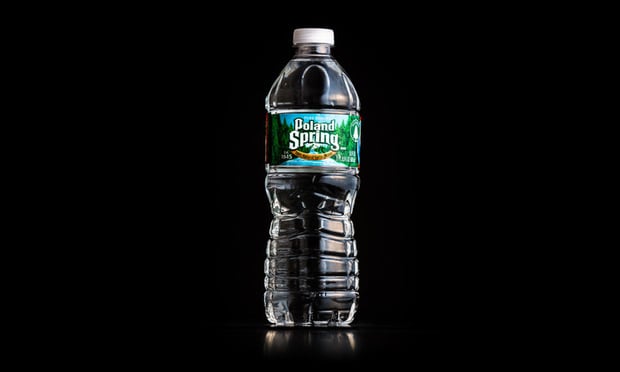Federal Judge Dismisses Suit Claiming Poland Spring's Water Isn't From Spring; State Suits Coming
Poland Spring got a victory of sorts from a Connecticut federal judge who dismissed a class action claiming breach of contract for saying the water comes from a spring. Suits are pending in state court.
May 21, 2018 at 03:12 PM
4 minute read

In the wake of a federal judge in Connecticut dismissing a putative class action lawsuit alleging Poland Spring's water did not come from a natural spring, plaintiffs' attorneys are vowing the legal fight will continue.
In his Thursday ruling, U.S. District Judge Jeffrey Meyer said he was dismissing the fraud case against Nestle Waters North America Inc., Poland Spring's parent company, because the claim was pre-empted by federal law.
Meyer said the U.S. Food and Drug Administration has enacted detailed rules and regulations defining spring water under the Food, Drug and Cosmetics Act. The act provides that only the federal government—not private parties—can enforce the violations.
But Meyer said the plaintiff attorneys, who are representing eight northeastern states, including Connecticut, New York and Massachusetts, can sue under state law within 30 days. That is exactly what the attorneys say they plan to do.
Alexander Schmidt, a New Jersey-based solo practitioner, issued a statement on the position of the eight attorneys representing the class. Schmidt said there would be no additional comments on the matter. The statement reads, in part: “The court rejected all of Nestle's arguments … holding that the plaintiff's should assert claims based on state law rules governing spring water. We intend to amend our complaint consistent with the ruling. The decision does not address the accuracy of our detailed factual allegations, which we look forward to providing.”
The lawsuit, among other things, claims that “not one drop” of Poland Spring bottled water is from a spring. The suit sought at least $5 million in damages for false advertising, deceptive labeling and breach of contract.
The U.S. Food and Drug Administration says spring water must come from an underground source and flow naturally to the earth's surface. Spring water, according to the government, doesn't have to be literally collected from a spring. It can also be pumped out from a hole in the ground.
On the other hand, groundwater, the government says, is water found underground in the cracks and spaces in soil, sand and rock. It is stored in and moved slowly through geologic formations of soil, sand and rocks called aquifers.
Each of the states cited in the lawsuit have language that varies slightly. And that language in many cases mirrors what the federal government says.
According to the Connecticut State Department of Public Health, spring water means “natural water obtained from an underground formation from which water flows naturally to the surface of the earth.” That is the only wording regarding spring water on the state's site. With regard to bottled water, the state says: “A bottler selling or distributing bottled water obtained from a source located out of state shall submit to the Commissioner of Consumer Protection a copy of a current license or approval for the use of such source from each government entity having jurisdiction to regulate the use of the source.”
Charles Broll, general counsel for Nestle, told the Connecticut Law Tribune Monday he had no comment on the pending amended suit. He referred all other comment to the company's statement. That statement reiterated the ruling by the judge. In addition, the statement comes with a recently released report in which the legal megafirm DLA Piper Global Law Firm wrote an extensive report stating the company's bottled water was, in fact, spring water. The company hired DLA Piper to conduct an investigation and write the report.
“While I can't comment specifically on a potential refiling without seeing it, I can say that the claims made in this lawsuit are without merit,” Broll said. “We will continue to defend ourselves vigorously and are highly confident in our legal position. The judge's decision to grant our motion to dismiss is proof of that.”
Poland Spring is represented by Jeffrey M. Garrod of Orloff Lowenbach Stifelman & Siegel and Jonathan B. Tropp of Day Pitney.
In addition to Schmidt, the other attorneys representing the class are: Craig Raabe and Robert Izard of Izard, Kindall & Raabe in West Hartford; Steven Williams and Alexander Barnett of Cotchett, Pitre & McCarthy in New York City and California; and Steven Sklaver, Amanda Bonn and Oleg Elkhunovich of Susman Godfrey in Los Angeles.
This content has been archived. It is available through our partners, LexisNexis® and Bloomberg Law.
To view this content, please continue to their sites.
Not a Lexis Subscriber?
Subscribe Now
Not a Bloomberg Law Subscriber?
Subscribe Now
NOT FOR REPRINT
© 2025 ALM Global, LLC, All Rights Reserved. Request academic re-use from www.copyright.com. All other uses, submit a request to [email protected]. For more information visit Asset & Logo Licensing.
You Might Like
View All


Discovery Seeks to Link Yale University to Doctor in Fertility Scandal
4 minute readTrending Stories
- 1Can a Law Firm Institutionalize Its Culture? Boies Schiller’s New Chairman Will Try
- 2Full 8th Circuit Hears First Amendment Challenge to School District’s ‘Equity Training’
- 3Exploring Generative AI’s Impact on Intellectual Property
- 4Training Lawyers in AI and Using AI to Boost Training
- 5EB-5 Rebounds After a Rocky Year: Challenges of 2024 Lay Groundwork for a Booming 2025
Who Got The Work
J. Brugh Lower of Gibbons has entered an appearance for industrial equipment supplier Devco Corporation in a pending trademark infringement lawsuit. The suit, accusing the defendant of selling knock-off Graco products, was filed Dec. 18 in New Jersey District Court by Rivkin Radler on behalf of Graco Inc. and Graco Minnesota. The case, assigned to U.S. District Judge Zahid N. Quraishi, is 3:24-cv-11294, Graco Inc. et al v. Devco Corporation.
Who Got The Work
Rebecca Maller-Stein and Kent A. Yalowitz of Arnold & Porter Kaye Scholer have entered their appearances for Hanaco Venture Capital and its executives, Lior Prosor and David Frankel, in a pending securities lawsuit. The action, filed on Dec. 24 in New York Southern District Court by Zell, Aron & Co. on behalf of Goldeneye Advisors, accuses the defendants of negligently and fraudulently managing the plaintiff's $1 million investment. The case, assigned to U.S. District Judge Vernon S. Broderick, is 1:24-cv-09918, Goldeneye Advisors, LLC v. Hanaco Venture Capital, Ltd. et al.
Who Got The Work
Attorneys from A&O Shearman has stepped in as defense counsel for Toronto-Dominion Bank and other defendants in a pending securities class action. The suit, filed Dec. 11 in New York Southern District Court by Bleichmar Fonti & Auld, accuses the defendants of concealing the bank's 'pervasive' deficiencies in regards to its compliance with the Bank Secrecy Act and the quality of its anti-money laundering controls. The case, assigned to U.S. District Judge Arun Subramanian, is 1:24-cv-09445, Gonzalez v. The Toronto-Dominion Bank et al.
Who Got The Work
Crown Castle International, a Pennsylvania company providing shared communications infrastructure, has turned to Luke D. Wolf of Gordon Rees Scully Mansukhani to fend off a pending breach-of-contract lawsuit. The court action, filed Nov. 25 in Michigan Eastern District Court by Hooper Hathaway PC on behalf of The Town Residences LLC, accuses Crown Castle of failing to transfer approximately $30,000 in utility payments from T-Mobile in breach of a roof-top lease and assignment agreement. The case, assigned to U.S. District Judge Susan K. Declercq, is 2:24-cv-13131, The Town Residences LLC v. T-Mobile US, Inc. et al.
Who Got The Work
Wilfred P. Coronato and Daniel M. Schwartz of McCarter & English have stepped in as defense counsel to Electrolux Home Products Inc. in a pending product liability lawsuit. The court action, filed Nov. 26 in New York Eastern District Court by Poulos Lopiccolo PC and Nagel Rice LLP on behalf of David Stern, alleges that the defendant's refrigerators’ drawers and shelving repeatedly break and fall apart within months after purchase. The case, assigned to U.S. District Judge Joan M. Azrack, is 2:24-cv-08204, Stern v. Electrolux Home Products, Inc.
Featured Firms
Law Offices of Gary Martin Hays & Associates, P.C.
(470) 294-1674
Law Offices of Mark E. Salomone
(857) 444-6468
Smith & Hassler
(713) 739-1250











